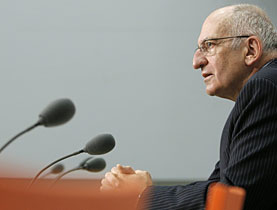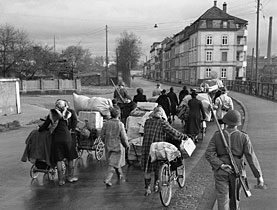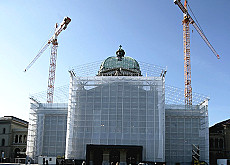Slip of tongue gets president into trouble

Swiss President Pascal Couchepin has landed himself in hot water after mixing the name of Nazi doctor Josef Mengele with that of a Swiss politician.
Couchepin, who admitted making an error and denied any attack or misplaced joke against the rightwing Swiss People’s Party strategist Christoph Mörgeli, is now trying to prevent the growing storm from spinning out of control.
“I am profoundly affected by this controversy, which saddens and shocks me, as it deals with something that goes to the very core of my beliefs,” he told journalists on Thursday.
Couchepin said he had chosen to speak publicly, and cut short his holiday, to prevent any controversy and avoid giving “the impression that such an unprecedented historical drama had been dealt with lightly”.
He also underlined his commitment towards respecting individuals, as well as combating racism, anti-Semitism, xenophobia and intolerance of any kind.
Since Wednesday Swiss media have been full of reports about Couchepin’s blunder, which happened during a meeting of a parliamentary committee. These meetings are usually held behind closed doors and are confidential.
Couchepin admitted having uttered the name of the infamous Nazi doctor Josef Mengele in front of the commission to underline the need for tough legislation on human research, but “not to make a comparison with anyone”.
Quizzed by journalists about what exactly was said during the committee session, the president said he asked his neighbour “What was the name of the monster of Auschwitz? Mörgele?” His neighbour replied: “No, Mengele.”
Serious matter
For Couchepin it was not meant as a joke. “I don’t think I smiled,” he said. “I saw someone smile and I said it was not a laughing matter. It’s serious.”
Couchepin admits being haunted by memories of the Holocaust ever since participating at a ceremony in Geneva on January 28 to honour sixty Swiss citizens, who saved thousands of Jews during the Second World War.
“I don’t think I would’ve mentioned the name of the Auschwitz doctor if the Holocaust hadn’t been on my mind a few days earlier,” he said.
Christoph Mörgeli, for his part, remains sceptical. He told Swiss radio and television that he couldn’t accept Couchepin’s explanation.
“The Swiss president knew what he was saying,” he declared, although he was not present at the meeting.
Couchepin regrets not having been able to resolve things with him directly. “If he had called me to ask what I said, it would have been obvious. I would have told him that there was no connection to him.”
“It was an error and not an attack. I won’t apologise. But I am sorry if Mr Mörgeli is hurt,” he said.
Media attention
The Mörgeli-Mengele affair has been widely reported in the Swiss media, especially in German-speaking regions.
The prestigious Neue Zürcher Zeitung newspaper warned that “the affair threatens to take on a momentum of its own”, adding that it is another example of how politicking in Switzerland has become more polarised.
The Basler Zeitung said Nazi comparisons were becoming more frequent in Switzerland, but not everyday occurrences as there are nowadays in Germany.
Recently, a German broadcaster dismissed a popular television presenter after she praised Nazi Germany’s family policy, and a justice minister had to resign because she likened President Bush to Hitler.
The Tages-Anzeiger played down the seriousness of the affair, but said Couchepin’s comments have damaged his credibility and already waning popularity:
“Couchepin loves to make grandiose as well as small remarks…It was not a premeditated attack, nor was it meant as a joke and he wasn’t speaking in public…There is a long way to go before it becomes an affair of the state, and it’s not a reason for Couchepin to resign. But it was a blunder that should never happen to a statesman.”
swissinfo
Pascal Couchepin is well known for his slips of the tongue.
On December 10, 2003 while waiting for new cabinet members Christoph Blocher and Hans-Rudolf Merz he was caught by Swiss television asking, “So where are the lads?”
On September 7, 2007, just before the October parliamentary elections he used strong words to criticise the campaign of the rightwing Swiss People’s Party, which accused parties of fomenting a plot against it and cabinet minister Christoph Blocher.
“There’s no plot to overthrow a minister,” he said in an interview on Swiss radio, adding that “no one, not even Il Duce”, was essential to the nation, alluding to Blocher.

In compliance with the JTI standards
More: SWI swissinfo.ch certified by the Journalism Trust Initiative


You can find an overview of ongoing debates with our journalists here. Please join us!
If you want to start a conversation about a topic raised in this article or want to report factual errors, email us at english@swissinfo.ch.